Abstract
Nonlinear analyses of infant heart rhythms reveal a marked rise in the complexity of the electrocardiogram with maturation. We find that normal mature infants (gestation greater than or equal to 35 weeks) have complex and distinctly nonlinear heart rhythms (consistent with recent reports for healthy adults) but that such nonlinearity is lacking in preterm infants (gestation > or = to 27 weeks) where parasympathetic-sympathetic interaction and function are presumed to be less well developed. Our study further shows that infants with clinical brain death and those treated with atropine exhibit a similar lack of nonlinear feedback control. These three lines of evidence support the hypothesis championed by Goldberger et al. [Goldberger, A.L., Rigney, D.R. & West, B.J. (1990) Sci. Am. 262, 43-49] that autonomic nervous system control underlies the nonlinearity and possible chaos of normal heart rhythms. This report demonstrates the acquisition of nonlinear heart rate dynamics and possible chaos in developing human infants and its loss in brain death and with the administration of atropine. It parallels earlier work documenting changes in the variability of heart rhythms in each of these cases and suggests that nonlinearity may provide additional power in characterizing physiological states.
Full text
PDF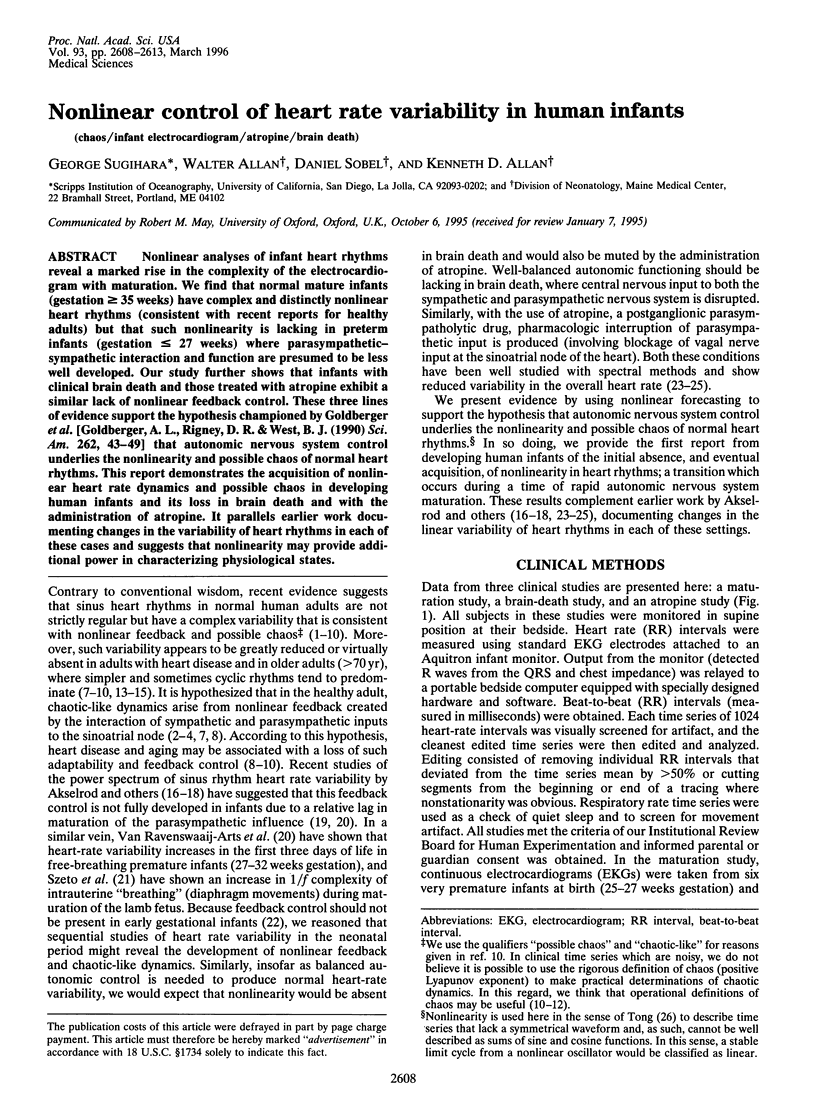
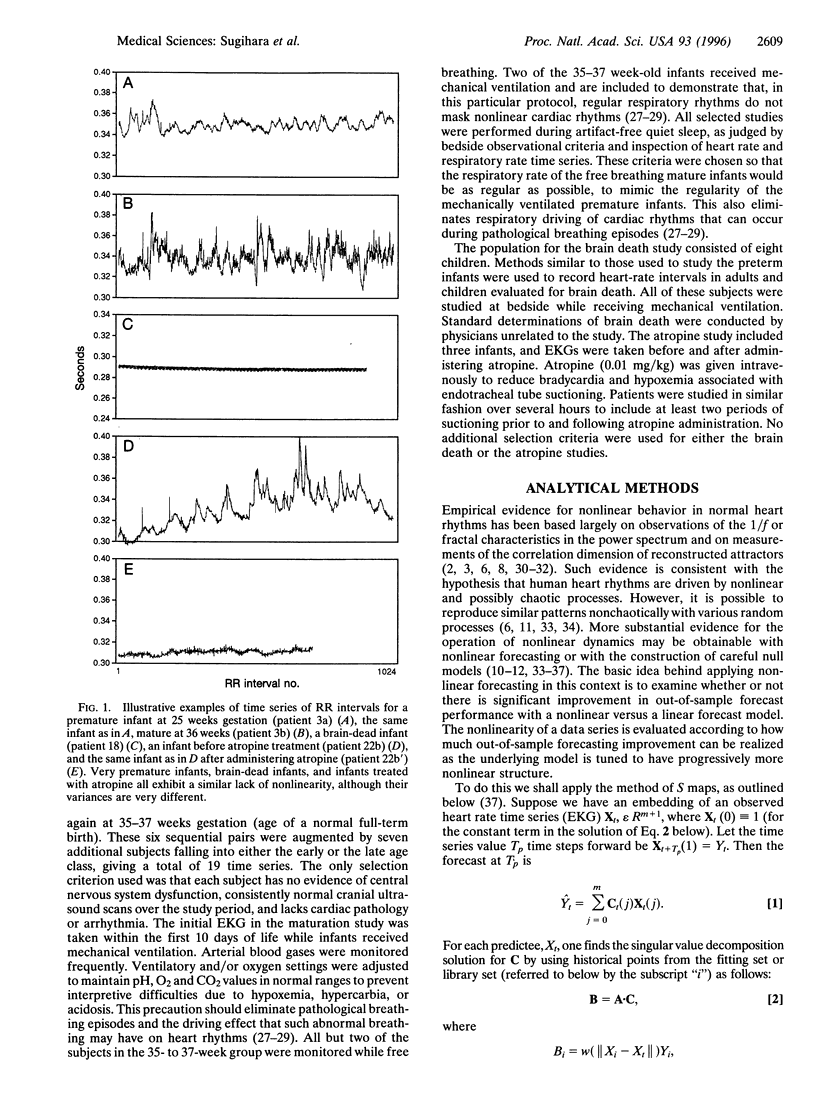
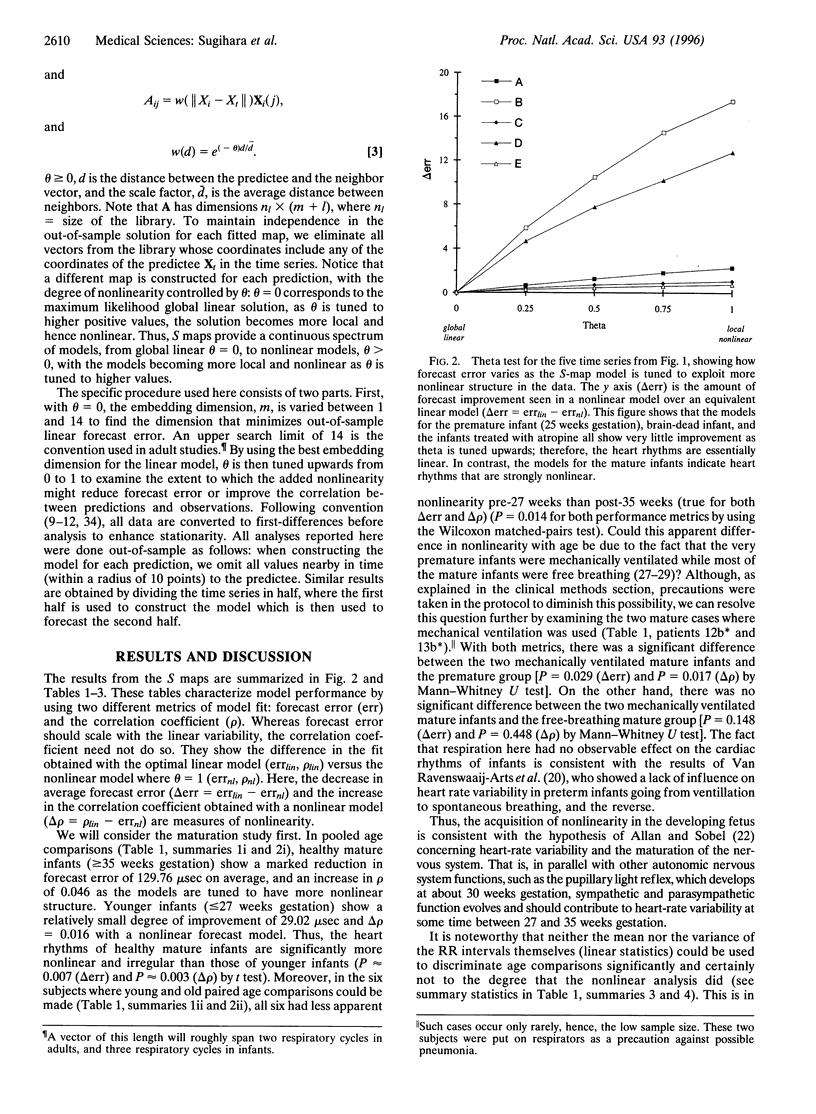
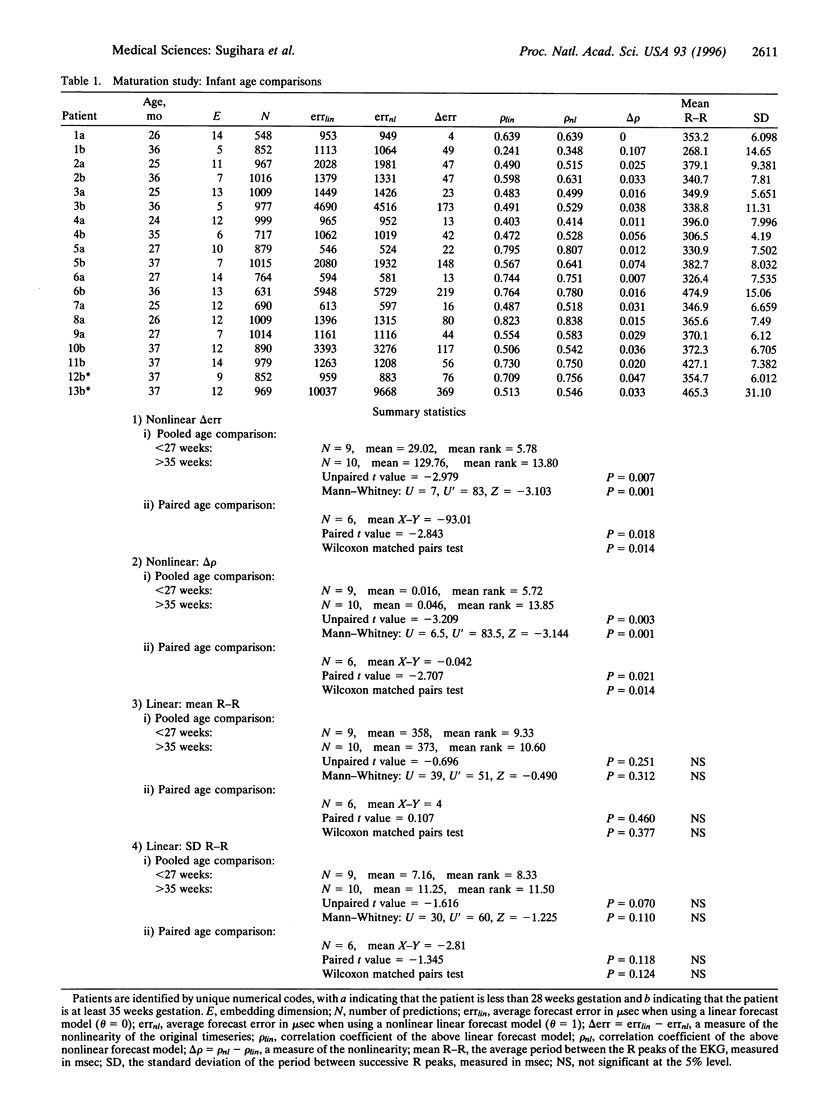
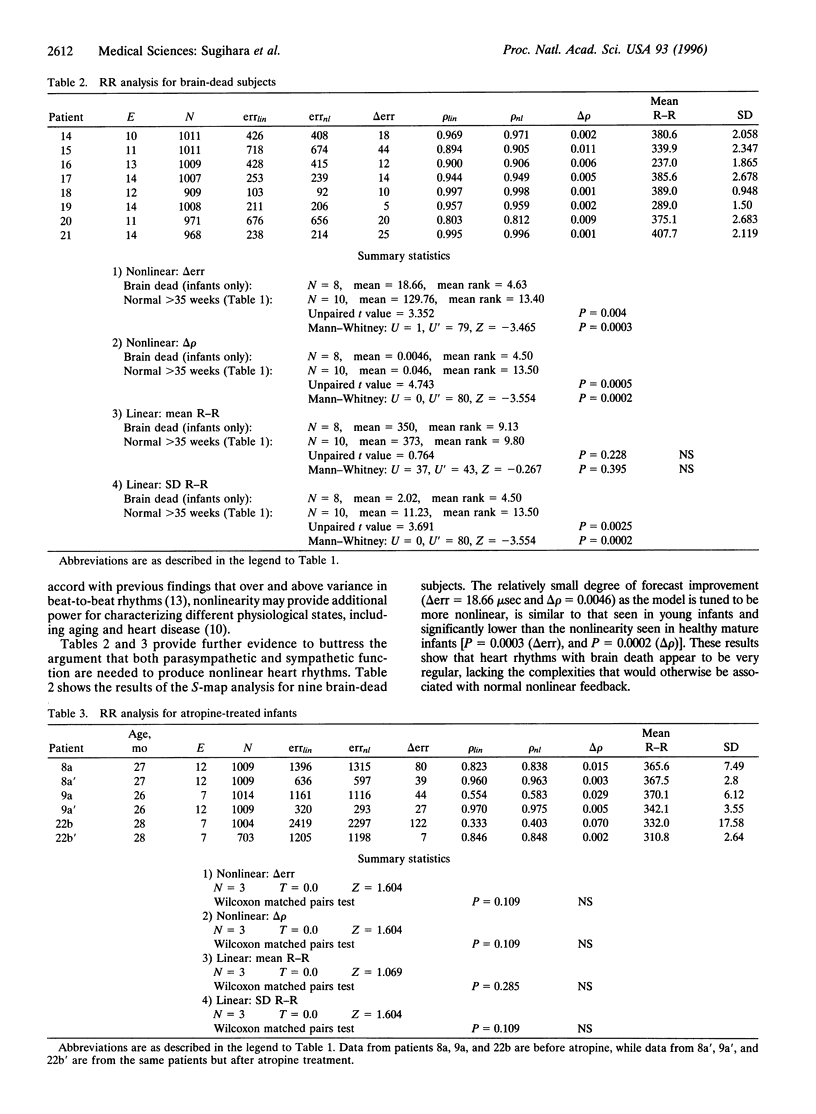
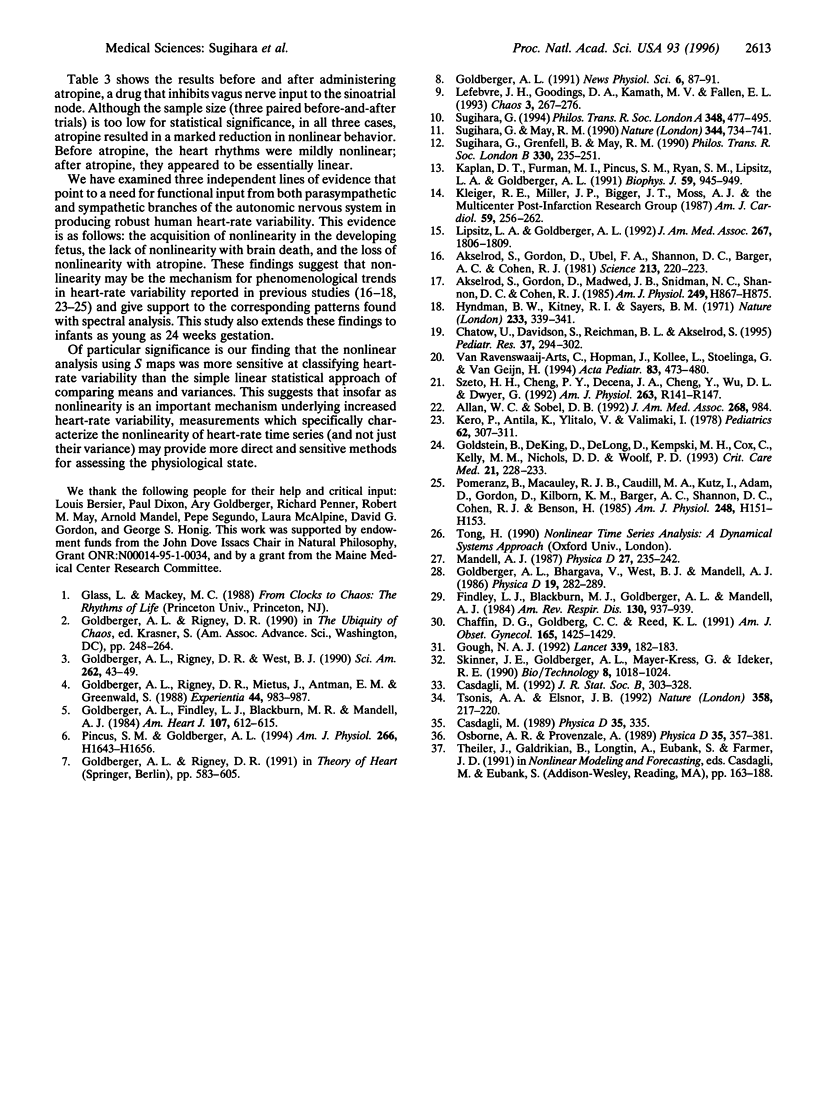
Selected References
These references are in PubMed. This may not be the complete list of references from this article.
- Akselrod S., Gordon D., Madwed J. B., Snidman N. C., Shannon D. C., Cohen R. J. Hemodynamic regulation: investigation by spectral analysis. Am J Physiol. 1985 Oct;249(4 Pt 2):H867–H875. doi: 10.1152/ajpheart.1985.249.4.H867. [DOI] [PubMed] [Google Scholar]
- Akselrod S., Gordon D., Ubel F. A., Shannon D. C., Berger A. C., Cohen R. J. Power spectrum analysis of heart rate fluctuation: a quantitative probe of beat-to-beat cardiovascular control. Science. 1981 Jul 10;213(4504):220–222. doi: 10.1126/science.6166045. [DOI] [PubMed] [Google Scholar]
- Allan W. C., Sobel D. B. The sans of time. JAMA. 1992 Aug 26;268(8):984–984. [PubMed] [Google Scholar]
- Chaffin D. G., Goldberg C. C., Reed K. L. The dimension of chaos in the fetal heart rate. Am J Obstet Gynecol. 1991 Nov;165(5 Pt 1):1425–1429. doi: 10.1016/0002-9378(91)90384-4. [DOI] [PubMed] [Google Scholar]
- Chatow U., Davidson S., Reichman B. L., Akselrod S. Development and maturation of the autonomic nervous system in premature and full-term infants using spectral analysis of heart rate fluctuations. Pediatr Res. 1995 Mar;37(3):294–302. doi: 10.1203/00006450-199503000-00008. [DOI] [PubMed] [Google Scholar]
- Findley L. J., Blackburn M. R., Goldberger A. L., Mandell A. J. Apneas and oscillation of cardiac ectopy in Cheyne-Stokes breathing during sleep. Am Rev Respir Dis. 1984 Nov;130(5):937–939. doi: 10.1164/arrd.1984.130.5.937. [DOI] [PubMed] [Google Scholar]
- Goldberger A. L., Findley L. J., Blackburn M. R., Mandell A. J. Nonlinear dynamics in heart failure: implications of long-wavelength cardiopulmonary oscillations. Am Heart J. 1984 Mar;107(3):612–615. doi: 10.1016/0002-8703(84)90120-0. [DOI] [PubMed] [Google Scholar]
- Goldberger A. L. Is the normal heartbeat chaotic or homeostatic? News Physiol Sci. 1991 Apr;6:87–91. doi: 10.1152/physiologyonline.1991.6.2.87. [DOI] [PubMed] [Google Scholar]
- Goldberger A. L., Rigney D. R., Mietus J., Antman E. M., Greenwald S. Nonlinear dynamics in sudden cardiac death syndrome: heartrate oscillations and bifurcations. Experientia. 1988 Dec 1;44(11-12):983–987. doi: 10.1007/BF01939894. [DOI] [PubMed] [Google Scholar]
- Goldberger A. L., Rigney D. R., West B. J. Chaos and fractals in human physiology. Sci Am. 1990 Feb;262(2):42–49. doi: 10.1038/scientificamerican0290-42. [DOI] [PubMed] [Google Scholar]
- Goldstein B., DeKing D., DeLong D. J., Kempski M. H., Cox C., Kelly M. M., Nichols D. D., Woolf P. D. Autonomic cardiovascular state after severe brain injury and brain death in children. Crit Care Med. 1993 Feb;21(2):228–233. doi: 10.1097/00003246-199302000-00014. [DOI] [PubMed] [Google Scholar]
- Gough N. A. Fractals, chaos, and fetal heart rate. Lancet. 1992 Jan 18;339(8786):182–183. doi: 10.1016/0140-6736(92)90250-7. [DOI] [PubMed] [Google Scholar]
- Hyndman B. W., Kitney R. I., Sayers B. M. Spontaneous rhythms in physiological control systems. Nature. 1971 Oct 1;233(5318):339–341. doi: 10.1038/233339a0. [DOI] [PubMed] [Google Scholar]
- Kaplan D. T., Furman M. I., Pincus S. M., Ryan S. M., Lipsitz L. A., Goldberger A. L. Aging and the complexity of cardiovascular dynamics. Biophys J. 1991 Apr;59(4):945–949. doi: 10.1016/S0006-3495(91)82309-8. [DOI] [PMC free article] [PubMed] [Google Scholar]
- Kero P., Antila K., Ylitalo V., Välimäki I. Decreased heart rate variation in decerebration syndrome: quantitative clinical criterion of brain death? Pediatrics. 1978 Sep;62(3):307–311. [PubMed] [Google Scholar]
- Kleiger R. E., Miller J. P., Bigger J. T., Jr, Moss A. J. Decreased heart rate variability and its association with increased mortality after acute myocardial infarction. Am J Cardiol. 1987 Feb 1;59(4):256–262. doi: 10.1016/0002-9149(87)90795-8. [DOI] [PubMed] [Google Scholar]
- Lefebvre J. H., Goodings D. A., Kamath M. V., Fallen E. L. Predictability of normal heart rhythms and deterministic chaos. Chaos. 1993 Apr;3(2):267–276. doi: 10.1063/1.165990. [DOI] [PubMed] [Google Scholar]
- Lipsitz L. A., Goldberger A. L. Loss of 'complexity' and aging. Potential applications of fractals and chaos theory to senescence. JAMA. 1992 Apr 1;267(13):1806–1809. [PubMed] [Google Scholar]
- Pincus S. M., Goldberger A. L. Physiological time-series analysis: what does regularity quantify? Am J Physiol. 1994 Apr;266(4 Pt 2):H1643–H1656. doi: 10.1152/ajpheart.1994.266.4.H1643. [DOI] [PubMed] [Google Scholar]
- Pomeranz B., Macaulay R. J., Caudill M. A., Kutz I., Adam D., Gordon D., Kilborn K. M., Barger A. C., Shannon D. C., Cohen R. J. Assessment of autonomic function in humans by heart rate spectral analysis. Am J Physiol. 1985 Jan;248(1 Pt 2):H151–H153. doi: 10.1152/ajpheart.1985.248.1.H151. [DOI] [PubMed] [Google Scholar]
- Sugihara G., Grenfell B., May R. M. Distinguishing error from chaos in ecological time series. Philos Trans R Soc Lond B Biol Sci. 1990 Nov 29;330(1257):235–251. doi: 10.1098/rstb.1990.0195. [DOI] [PubMed] [Google Scholar]
- Sugihara G., May R. M. Nonlinear forecasting as a way of distinguishing chaos from measurement error in time series. Nature. 1990 Apr 19;344(6268):734–741. doi: 10.1038/344734a0. [DOI] [PubMed] [Google Scholar]
- Szeto H. H., Cheng P. Y., Decena J. A., Cheng Y., Wu D. L., Dwyer G. Fractal properties in fetal breathing dynamics. Am J Physiol. 1992 Jul;263(1 Pt 2):R141–R147. doi: 10.1152/ajpregu.1992.263.1.R141. [DOI] [PubMed] [Google Scholar]
- Van Ravenswaaij-Arts C., Hopman J., Kollée L., Stoelinga G., Van Geijn H. Spectral analysis of heart rate variability in spontaneously breathing very preterm infants. Acta Paediatr. 1994 May;83(5):473–480. doi: 10.1111/j.1651-2227.1994.tb13062.x. [DOI] [PubMed] [Google Scholar]


